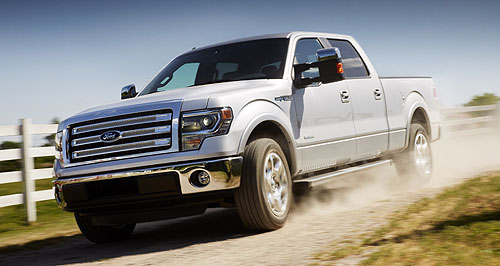Make / Model Search
News - FordFord and Toyota end hybrid dealHulking hybrid: Ford’s F-Series utility range could be powered by a Ford-developed hybrid drivetrain by the end of the decade. Ford to develop truck and SUV hybrid tech on its own after split with Toyota25 Jul 2013 CAR-MAKING giants Ford and Toyota have ended their agreement to develop a new hybrid system for light trucks and SUVs, with Ford choosing to go it alone on the rear-drive powertrain. The partnership ended after two years of research and development, with Ford group vice-president of global product development Raj Nair confirming the end of the collaboration to Bloomberg. “Both parties gained from each other’s expertise and insight,” he said. “We’ve developed a lot of expertise in-house and determined we could deliver the system on our own.” Mr Nair did not discuss timing, but said Ford would continue to work with Toyota on standards for in-car technology and communication systems. The two car-makers already have an agreement to share customer and emergency call centres in China. The news comes as Ford this week announced a big boost in its US hybrid sales. The Blue Oval now has a 16 per cent market share of electrified vehicles, up from four per cent in the same period last year. The 400 per cent sales boost saw Ford shift 46,197 hybrid or electric vehicles to the end of June this year, with the C-Max Hybrid and C-Max Energi plug-in hybrid compact-MPV, and mid-size Fusion Hybrid having the biggest impact. In the second quarter of 2013, Ford enjoyed a 517 per cent increase in sales over the same period last year, shifting a record 24,217 hybrids, the best quarter-end result so far for the car-maker. A statement from Ford confirmed the company was moving forward with its own development of a rear-wheel drive hybrid system, “based on an all-new architecture to deliver the capability truck and SUV customers demand while providing greater fuel economy.” Mr Nair said producing the system in-house would allow Ford to roll-out hybrid variants to a greater number of models in coming years. “We know what it takes to build world-class hybrids, and we now will build and leverage that expertise in-house,” he said. Originally signed in August 2011, the deal would have seen the two companies work together to engineer a rear-drive hybrid drivetrain for SUVs and light trucks that would appear in Ford and Toyota product in the later part of the decade. While the hybrid technology was to be developed jointly, each car-maker would independently integrate the system into their future vehicles. Ford said at the time of the deal the collaboration would allow both manufacturers “to bring these hybrid technologies to customers sooner and more affordably than either company could have accomplished alone.” Neither company has confirmed which vehicles the hybrid drivetrain was destined for, but there has been speculation Ford’s iconic F-150 utility range would end up with hybrid power, along with a number of SUVs in both car-maker’s line-ups. Toyota also confirmed the split in a statement, saying it had “completed their feasibility study” for collaboration on the hybrid system, but highlighted other tie-ins with the US car-maker. “Toyota and Ford continue to evaluate the feasibility of working together on next-generation standards for telematics and will consider other areas for future collaboration as well.” Ford’s investment in its future hybrid technology continues, with confirmation it will hire an additional 200 electrification engineers and expand its US research facilities to accelerate hybrid and EV development. The company says it has invested more than $US355 million in the last year for the design, engineering and manufacture of components for its petrol-electric and full electric line-up, while an additional $US50 million will be pumped into its battery-testing capabilities. Despite the amicable split with Toyota, Ford said in its statement that it was stealing Toyota sales, adding that more customers are “coming from non-Ford brands, with Toyota and Honda vehicles the top competitive trade-ins.” As well as the C-Max and Fusion, Ford USA offers a hybrid version of luxury brand Lincoln’s MKZ sedan and an all-electric Focus hatch. Toyota still leads Ford in the US with 176,506 hybrid sales in the first half of the year, accounting for around two-thirds of the overall hybrid market. The Japanese giant recently topped three million global sales for its Prius hybrid, while sales of all models in the Prius family climbed to 3.4 million to the end of June this year. Toyota’s cumulative global hybrid sales hit the five million mark earlier this year, with almost two million units sold in the US alone. Last year, hybrids made up 14 per cent of Toyota’s global vehicle sales. The Japanese car-maker currently has 19 hybrid or plug-in hybrid vehicles in its model arsenal and it plans to add another 18 models by the end of 2015.  Read more9th of November 2012  Toyota hails hybrid sales recordMore than one million Toyota Group hybrids sold in 2012, including Australian record22nd of May 2012  Hybrid milestone for ToyotaToyota reaches four million hybrid sales as model range expands and demand increases |
Click to shareFord articlesResearch Ford Motor industry news |











Facebook Twitter Instagram